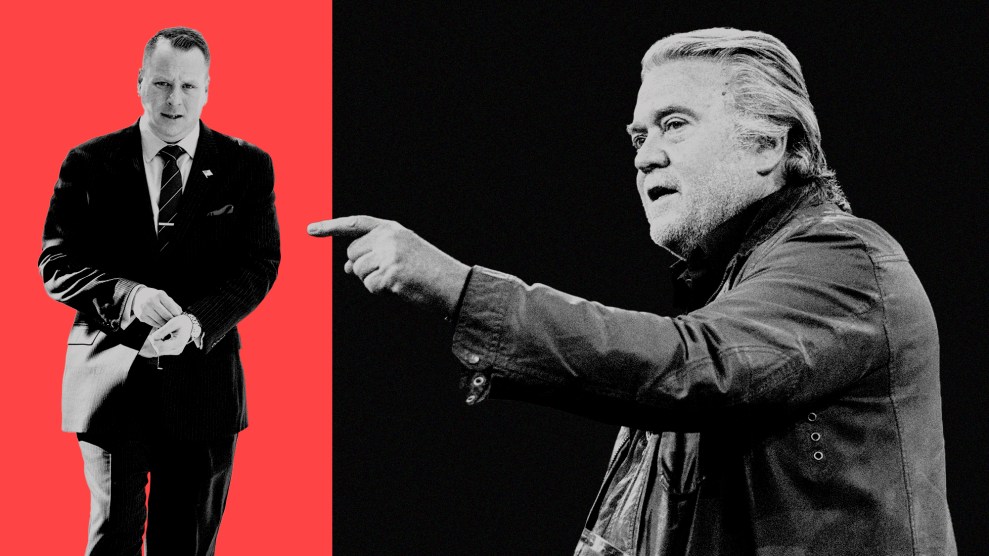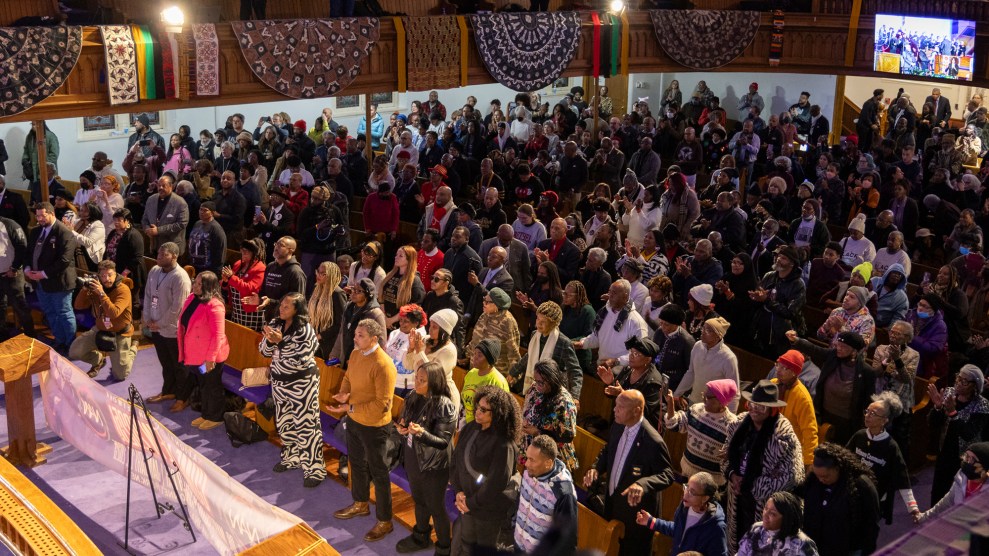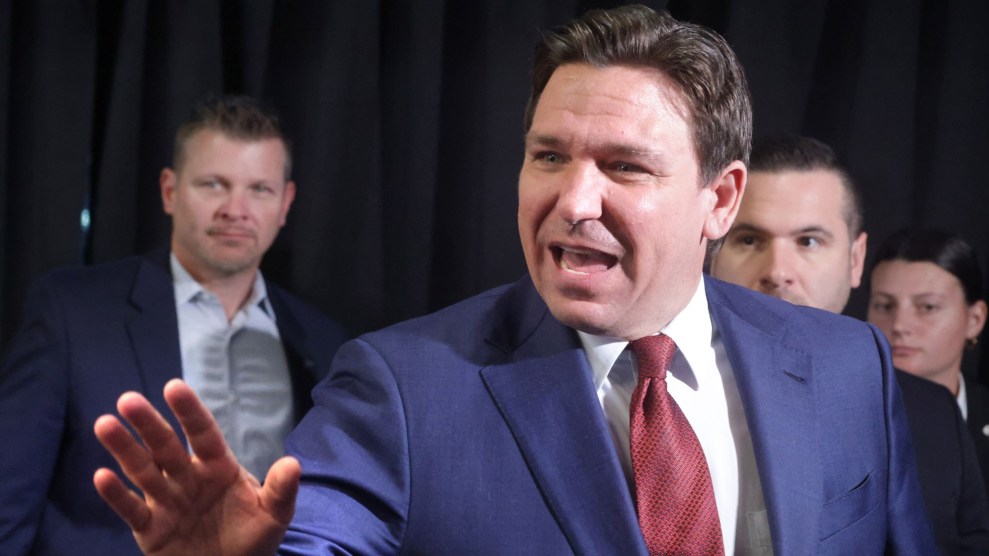
Mother Jones illustration; Lev Radin/Zuma; J. Scott Applewhite/AP
In December 2018, Sam Nunberg met with Steve Bannon at the Loews Regency hotel in Manhattan. Nunberg, a former Donald Trump campaign aide, expected to discuss work he was doing for a PAC that Bannon ran. But Bannon, whom Trump had fired from a White House job the year before, had other plans.
Nunberg says that moments after the meeting began, Bannon pulled out what he said was a printed lawsuit and warned that the fugitive Chinese mogul Guo Wengui was poised to sue Nunberg.
Bannon—who was working for Guo at the time—said he could have the lawsuit shelved. But Bannon wanted something in return: Nunberg would have to appear in a video with Guo and claim that Nunberg had learned that three other men had conspired to fabricate a rape allegation against Guo made by a former personal assistant—an allegation that had resulted in a criminal case in China and a lawsuit in New York, both begun in 2017.
Further, Bannon wanted Nunberg to say that the same three supposed accomplices—a Chinese entrepreneur named Bruno Wu, casino mogul Steve Wynn, and GOP fundraiser Elliott Broidy—were involved in the issuing of a “red notice” by Interpol seeking the arrest of Guo for alleged financial crimes in China, Nunberg recalled.
“You have to cooperate, and this can be dropped,” Bannon said, according to a memo Nunberg wrote shortly after the incident. “Otherwise Kwok is going to bankrupt you and ruin your life.” (Ho Wan Kwok is one of several aliases used by Guo.) Nunberg, who recounted this exchange in a series of recent interviews with Mother Jones, wrote in his memo that the quotes he used are “almost verbatim.”
Nunberg, who said the story Bannon proposed was totally false, refused his demands. Days later, Guo sued Nunberg for defamation and other claims.
Bannon is currently serving a four-month federal prison sentence in Connecticut following his 2022 conviction on contempt of Congress charges related to his refusal to comply with a subpoena from the House January 6 committee. He did not respond to requests made through his attorney to comment for this story. Representatives for Guo, Broidy, Wu, and Wynn declined to comment.
The narrative Bannon wanted Nunberg to recite incorporated some reality. Wu was a Guo adversary already embroiled in litigation against Guo. And Wu acknowledged, in a 2021 deposition, that after learning of the rape accusation against Guo, he had helped Guo’s accuser find a US lawyer, a step with which Nunberg, who did legal work for Wu, had assisted. Wu also said in the deposition that he paid the legal costs for the accuser’s US lawsuit against Guo, which included putting up a $150,00o retainer.
Broidy and Wynn had both lobbied Trump in 2017 to have Guo—who’d fled China in 2014 and later styled himself a top critic of the Chinese Communist Party—extradited to his home country. In 2020, Broidy pleaded guilty to conspiring to violate foreign lobbying laws. His lobbying included working, at the urging of a Chinese security official, to have Guo returned to China. The Justice Department sued Wynn in 2022 for failing to register as a foreign agent for China, arguing that he had personally lobbied Trump for Guo’s extradition in a bid to get favorable treatment for casinos he owned in China’s Macao region. Wynn, who denied those allegations, prevailed in court.
But while Bannon had correctly identified four actual Guo enemies, there is zero evidence that they had conspired to concoct the rape allegation against Guo or were responsible for other charges being leveled against him in China.
The rape accusation against Guo was made by Rui Ma, a former personal assistant for Guo who sued the tycoon in New York. Ma detailed her allegations in a daylong deposition on June 3, 2021, which she took part in via video from China. Ma said that Guo, after hiring her in 2015 when she was in her mid-twenties, had effectively held her as a prisoner for two years before she escaped via the Chinese embassy in London. In her complaint and her deposition, Ma detailed the circumstances of at least five alleged assaults.
“I have been raped by him so many times,” Ma said in the deposition. “It made me hate myself so much.” Ma said that the attacks left her depressed. “I wanted to commit suicide every day, every second,” she recounted later in the deposition. “Kwok has cursed me, abused me, attacks me in ways, the worst words you can use in this world.”
Guo has denied Ma’s allegations, claiming that they, along with various criminal charges he faces in China, were invented by Chinese Communist Party officials in retaliation for his criticism of the country’s rulers. Ma said in her deposition that she had reported the assaults to local police at the encouragement of her parents, without any outside influence.
Nunberg said in recent interviews that he had nothing to do with the rape charge, beyond helping Ma find a US lawyer, or the other allegations against Guo in China. Nunberg also said that he has never met Broidy or Wynn, let alone conspired with them. Wu said in his deposition in the Ma case that he had contacted Ma and helped her file suit in the US only after learning she had reported Guo’s alleged attacks to Chinese police.
Bannon’s intervention in the dispute gained new relevance in July, when a jury in New York convicted Guo of nine felonies related to federal charges that he stole hundreds of millions of dollars in investments he had raised from ardent supporters of an anti-CCP political movement that he and Bannon had launched together. One of the charges Guo was convicted on was racketeering conspiracy. Prosecutors argued that Guo and his associates protected their criminal enterprise through various thuggish methods.
Federal prosecutors named Bannon as a co-conspirator in the case, though Bannon has not been charged with a crime in the matter.
Bannon’s alleged threat to Nunberg highlights how deeply enmeshed in Guo’s operations the former Trump campaign chief was. Bannon was infamously arrested on Guo’s yacht in 2020 as part of an unrelated case, but his role in helping to launch Guo’s political and financial operations in the United States exceeds what is generally known or what Bannon has publicly acknowledged.
Guo had made a fortune in Chinese real estate before fleeing China in late 2014 ahead of the filing of criminal charges for fraud and bribing a top state official. In 2017, from a $68 million penthouse in Manhattan, Guo began broadcasting allegations about corruption in the Chinese Communist Party, and he began cultivating ties to US political operatives close to Trump, most prominently Bannon.
Guo in 2018 began paying Bannon $1 million a year, according to information revealed during Guo’s trial. Guo also allowed Bannon to use his private plane and gave him access to his Connecticut house and the $30 million yacht. In addition, Guo became a key funder for War Room, the influential podcast Bannon launched in 2019.
Bannon in turn helped Guo start a series of companies and nonprofits supposedly aimed at undermining the Chinese Communist Party. The men called this collective enterprise a “whistleblower” movement and leveraged it to win support from tens of thousands of people in the Chinese diaspora. When Guo in 2020 began rolling out “investment opportunities” for his supporters, Bannon provided behind-the-scenes advice along with public promotion. He continued extolling Guo, who he called the “George Washington of the new China,” even as critics began complaining that Guo had ripped them off. Bannon, in short, was crucial to the fraud scheme that Guo was recently convicted of executing.
Bannon’s alleged threat against Nunberg appears to have been part of a pattern of Guo and his allies using expensive lawsuits to harass his critics. Guo sued the Wall Street Journal, CNN, and McClatchy newspapers for reporting on allegations that he had acted in the US as a Chinese intelligence agent. He sued former employees who criticized him. He sued Broidy, past business partners, even a law firm that once represented him. Guo has found little success in court. Many of his suits were quickly dismissed. But his complaints, often accompanied by allegations that the person he sued was a CCP agent, made it clear that he was willing to use his wealth to impose legal costs on detractors.
In 2023, a federal judge sanctioned Guo lawyers for filing a “frivolous” lawsuit accusing the US trustee in a bankruptcy case initiated by Guo of violating foreign lobbying laws. Though the suit was filed on behalf of a group of Guo supporters, Judge Valerie Caproni said in her ruling that the case was part of a legal campaign waged by Guo. Caproni ripped the attorneys for their “pattern of bringing meritless…claims against Mr. [Guo’s] adversaries — conduct that he has praised.” She said the plaintiffs’ “true preoccupation is…trying to ‘defend’ [Guo] by harassing those perceived to be his adversaries.”
One Guo legal action that did succeed was a 2018 lawsuit he filed against longtime Trump adviser Roger Stone. Stone, in appearances on Alex Jones’ Infowars, had falsely claimed that Guo was found guilty and convicted of financial crimes in the US and had made illegal political donations to Hillary Clinton. Guo sued Stone for defamation, seeking $100 million in damages.
Stone settled the suit in December 2018 by acknowledging his remarks were untrue and apologizing in ads he was required to place in national newspapers. In a statement he issued at the time, Stone, who had previously worked closely with Nunberg before the two had a falling out, blamed his former colleague. “I made the error of relying on the representations of Sam Nunberg in my report on this matter and for that I apologized,” Stone said.
Bannon’s attempt to pressure Nunberg came the day after news of Stone’s settlement. And Bannon referenced it in the Loews meeting. “You saw what just happened to Roger Stone,” Bannon said, according to Nunberg’s memo.
Nunberg said in an interview that Stone’s statement was false. “I never talked to Roger about Guo,” he maintained.
But Guo’s lawsuit against Nunberg picked up on Stone’s story. It accused Nunberg of conspiring with Wu to spread “false information about [Guo] to prominent United States media personalities.” These claims were separate from the rape allegations. A New York judge dismissed Guo’s suit, finding it failed to provide sufficient facts about how Nunberg and Wu supposedly defamed him.
A few months later, Nunberg sued Guo for defamation, citing a series of online videos in which Guo repeated, and elaborated on, the allegations he made in his lawsuit against Nunberg. In his complaint, Nunberg called Guo’s allegations “preposterous fictions.” Nunberg’s lawsuit, along with Ma’s case against Guo, is pending.
Guo, who has been jailed since his March 2023 arrest, is likely to receive a long prison term when he is sentenced on December 9. Nunberg said he hopes that by speaking up about the 2018 incident, he can help thwart any efforts by Bannon to win clemency for Guo if Trump retakes the White House. Bannon received his own pardon on Trump’s last day in office in 2021, allowing Bannon to avoid federal prosecution on charges that he helped to defraud donors to a charity that purported to raise private funds to build Trump’s border wall. Bannon is set to face trial on similar state-level charges in New York in December.
“Steve is completely compromised by Guo,” Nunberg said. “He will do anything and everything to push for Guo to be pardoned for his massive, billion-dollar fraud scheme. I hope any future Trump White House rejects Bannon’s request.”

















